by cidaut | Jul 19, 2019 | Energy
On May 17th, CIDAUT had the pleasure of attending to the International Sustainable Mobility Forum (FIMS) in Entroncamento (Portugal) in such an incomparable setting as the National Railway Museum. CIDAUT participated as a speaker in the meeting entitled Hydrogen-based emission-less mobility and transportation solutions
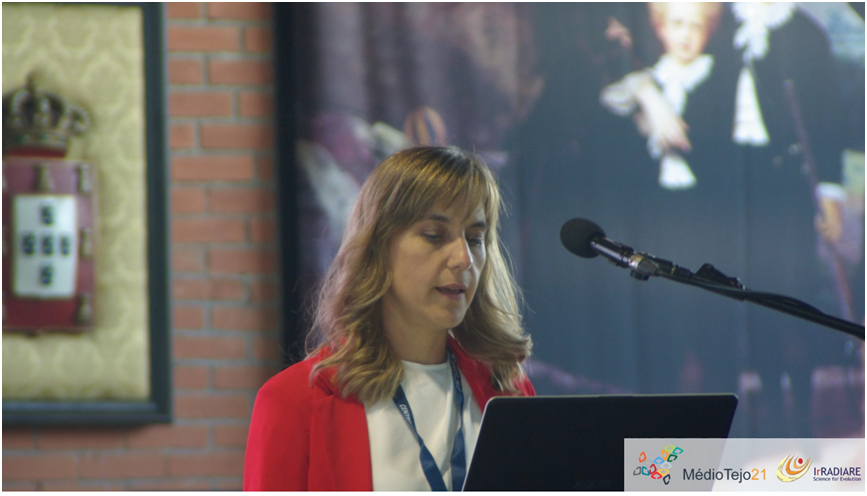
This forum aims to promote a meeting of the supply and demand of innovative hydrogen and fuel cell solutions in transport systems in the context of emissions-free mobility. The event brought together suppliers of technology solutions, industry, transport management entities and fleet owners, urban planners, land managers and decision makers – among others – promoting mutual updating on opportunities and challenges related to the use of hydrogen. Hydrogen ecosystems, such as production, storage, distribution, refueling and end-use, are presented through innovative pilot projects carried out in the context of European projects and strategies.
The forum “Hydrogen-based Low Carbon Transport and Mobility Solutions” aims to present functional options in the area of hydrogen and fuel cells demonstrated in European cities and regions, present innovative technological solutions and discuss methodologies to accelerate the deployment and implementation of hydrogen and technologies in the mobility and transport sectors.
It was attended by the Secretary of State for Mobility Protuguese, José Mendes, as well as representatives of the regional authorities of Medio Tejo and Cities, regions, Hydrogen and fuel cell associations, investors, industry, mobility and other stakeholders with a keen interest in the hydrogen sector and its outcomes and interested to learn more about the local Hydrogen Clusters and willing to develop partnerships.
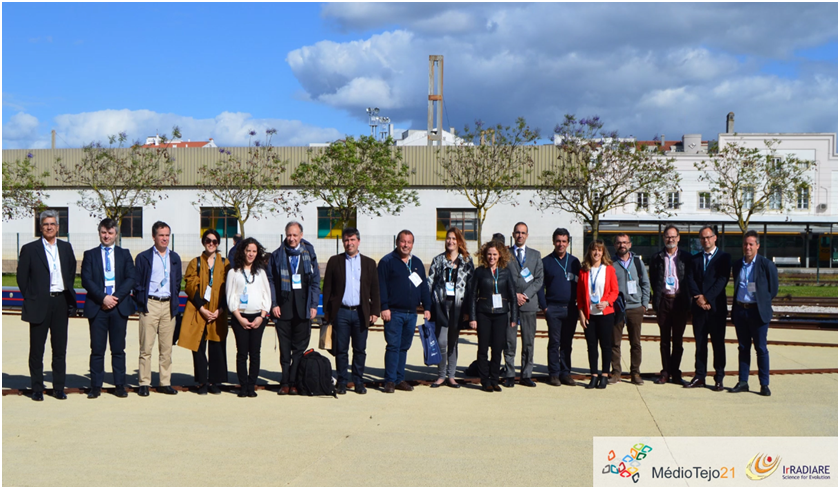
Continuing with the European events on Hydrogen, CIDAUT also attended on June 25th the kick-off meeting of the Intelligent Platform S3 European Hydrogen Valleys Partnership held in Brussels. CIDAUT was invited by the Regional Energy Agency (EREN). This platform is established in Normandy, Auvergne-Rhone-Alpes, Northen, Netherlands and Aragon, and aims to strengthen interregional cooperation across the EU on S3 common areas to co-develop investment projects for the modernization of the European industry.
During the meeting there was an introduction of the Partnership mission, after which there was a round of presentation of the present regions in the kick-off meeting and their interest in hydrogen technologies. Finally, a presentation of the analysis of the preliminary mapping questionnaires was made which will sent to the different regions whose results and it will be presented at the next meeting to be held on October 15th.
This event was held coinciding with the celebration of the H2020 Energy Infodays that took place from June 24th to 26th. CIDAUT attended on June 26th where the topics on Research, Innovation and Market uptake projects on Clean Energy were presented.
by cidaut | May 17, 2019 | Energy
The current decarbonisation policies place hydrogen in the spotlight of sustainable energy development. This aspect is reinforced by the fact of the need for large-scale energy storage to manage an electrical system with high renewable production where hydrogen plays a fundamental role. In addition, on February 11, the “Hydrogen Roadmap Europe” was published by the Fuel Cell and Hydrogen Joint Undertaking, which highlights the need to use hydrogen to achieve high decarbonisation rates and reduce CO2 emissions by 80%.
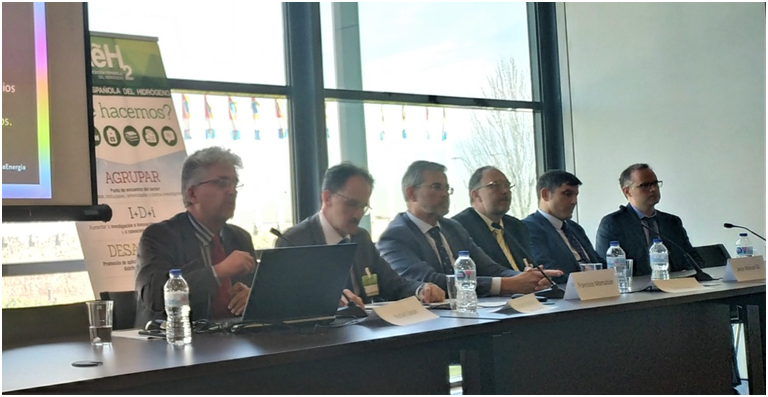
CIDAUT as a national reference in the field of hydrogen technologies participated in the technical conference of February 28, 2019: “The role of hydrogen in the energy transition”, which was developed within the program of activities of the International Fair of Energy and Environment (GENERA) held in Madrid.
This conference helped to highlight the key role that hydrogen will play in the energy transition and to define the actions that must be carried out to achieve the development of these technologies in Spain. During the conference, attended by the Secretary of State for Energy, José Domínguez Abascal, the current decarbonisation policies were discussed and the need for the implementation of hydrogen technologies in the European context of energy transition was exposed.
In the first round table of the day, the representatives of the main Ministries and national entities related to Energy, Industry, Science and Innovation debated on the importance of hydrogen to reach a carbon-free energy system.
In a second part of the conference, institutional partners of the AeH2 presented the “Main initiatives of the hydrogen sector and fuel cells in Spain”. As one of the partners, CIDAUT exposed its extensive experience in R&D projects within the field of hydrogen technologies and stressed its commitment to the future of hydrogen as an energy vector and decarbonization factor.
But this was not the only event that took place in Madrid on hydrogen. On March 1, the National Infoday of the Call 2019 of the FCH 2 JU was held in the Assembly Hall of the Center for Industrial Technological Development, CDTI. CIDAUT attended the Infoday where we could know firsthand all the information related to the call.
During the Infoday, Ms. María Luisa Revilla, from the Department of Social Challenges of the CDTI, presented the objectives and general vision of the FCH 2 JU and the H2020, as well as the rules for participation and presentation of proposals within the framework of H2020. The infoday was attended too by Mr. Carlos Navas, Head of the Strategy and Market Development Department of the FCH 2 JU, who presented the strategic vision and role of hydrogen in the European energy transition. In addition, he presented the topics included in this call and the keys for the presentation of proposals. The budget of this call is 80.8 million euros and 17 topics are considered: 5 related to transport, 8 with energy, 3 cross-cutting or cross-sectoral themes and 1 general. Finally, Mr. Antonio González, vice president of AeH2 and president of PTE HPC, explained the current situation of hydrogen technologies and fuel cells in Spain, explaining the key role they will play in the energy transition towards a carbon-free system.
by cidaut | Dec 21, 2018 | Energy
One more year CIDAUT participates in the National Congress of R & D in Defense and Security, this year celebrated in Valladolid from November 20 to 22, 2018.
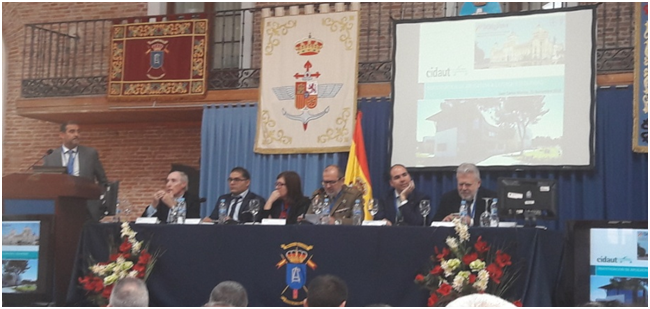
In this congress, CIDAUT exhibited its technological capabilities and presented a poster about the use of H2 in the military camp of the future, demonstrating that hydrogen is the ideal energy vector for silent applications, with a higher energy stored ratio by weight than electric batteries.
The poster presented the work carried out in the development of H2 generation in situ from diesel by reforming processes, in the scope of the REFORDI project developed with the INTA (National Institute of Aerospace Technology), reaching the construction of a 25 kW prototype.
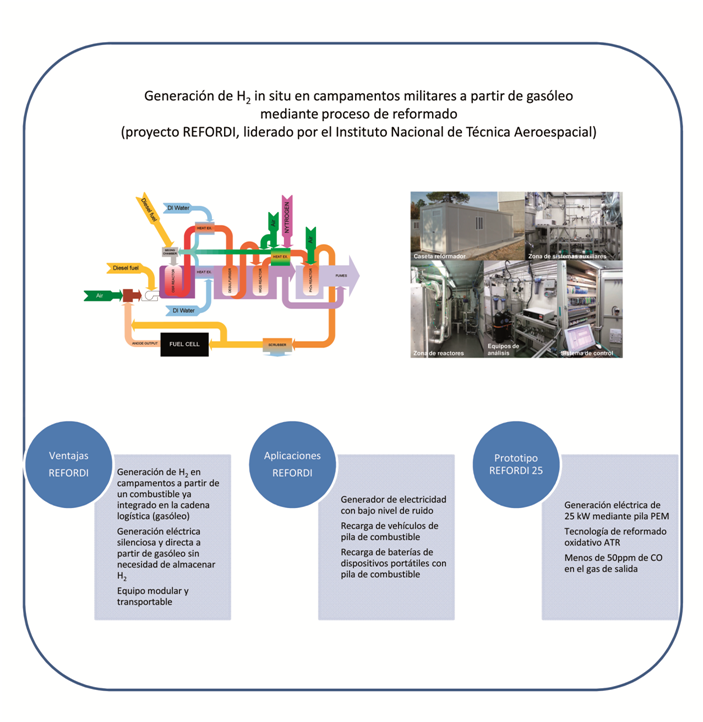
by cidaut | May 18, 2018 | Sin categoría
The Regions & Cities initiative (http://www.fch.europa.eu/page/about-initiative) is conducting a second round of workshops across Europe. The workshops are aimed to promote knowledge exchange on best practices in FCH project development and to discuss the way followed by European cities and regions to implement FCH projects.
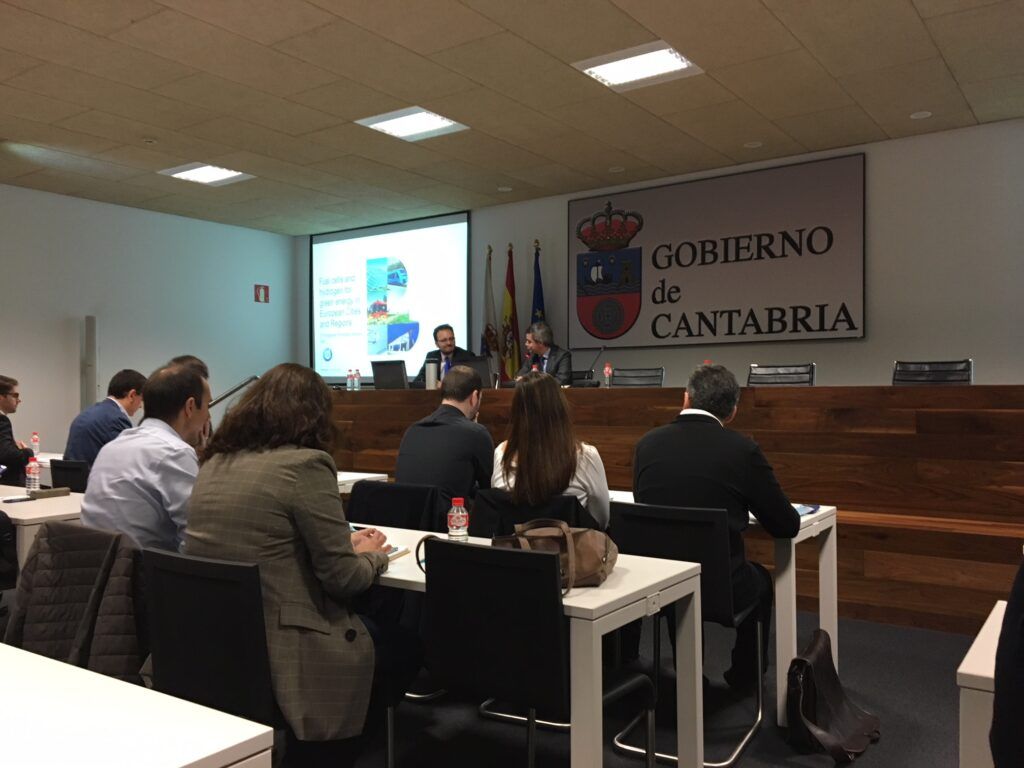 Welcome and introduction to the workshop by Roland Berger team and Jorge Muyo from Government of Cantabria
Welcome and introduction to the workshop by Roland Berger team and Jorge Muyo from Government of Cantabria
After the successful first round of workshops with many interesting discussions and learnings, a second round has been conducted in various European cities in April 2018. This time, in Spain, it was held in Santander on April 24 at the Science and Technology Park of Cantabria. CIDAUT and Valladolid City Council attended the workshop as stakeholders of the initiative.
The meeting started with the welcome from Jorge Muyo, Director of Innovation, Technological Development and Industrial Entrepreneurship of the Goverment of Cantabria. It continued with the presentation of the main objectives by Roland Berger team, highlighting the exchange of experiences and lessons learnt on key topics in FCH projects under development. As experts in this type of projects, a review of best practices in implementing FCH projects was carried out. It was remark the importance of creating conducive framework conditions with soft measures and policies, scoping local FCH project concepts (key elements and success factors) and engaging local stakeholders with a proper management.
The workshop was attended by Carlos Navas as representative of the FCHJU who conducted a presentation on Hydrogen in Spain. He stressed that in order to achieve the CO2 emission reductions established in the 2040-2050 scenarios, decarbonisation measures necessarily pass through hydrogen technologies, especially in the transport and industry sectors. Taking into account the hydrogen economy: hydrogen allows more renewables in the energy system and enables sector-coupling. He highlighted the 7 roles for hydrogen in the energy transition.
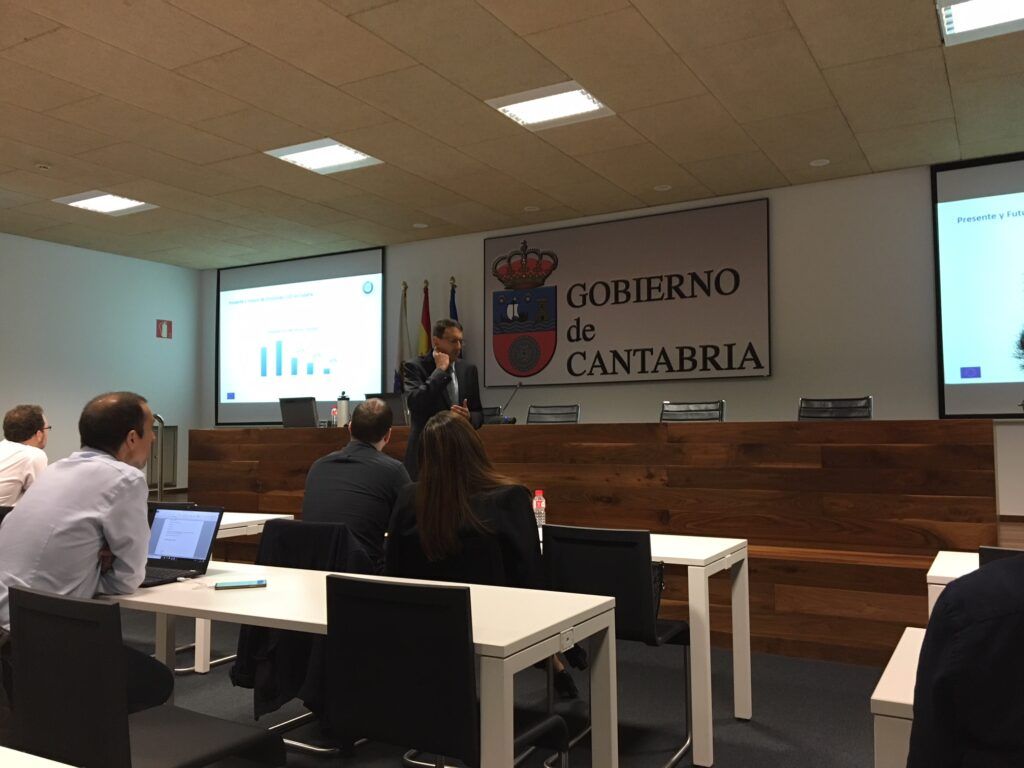 Carlos Navas FCH JU presentation
Carlos Navas FCH JU presentation
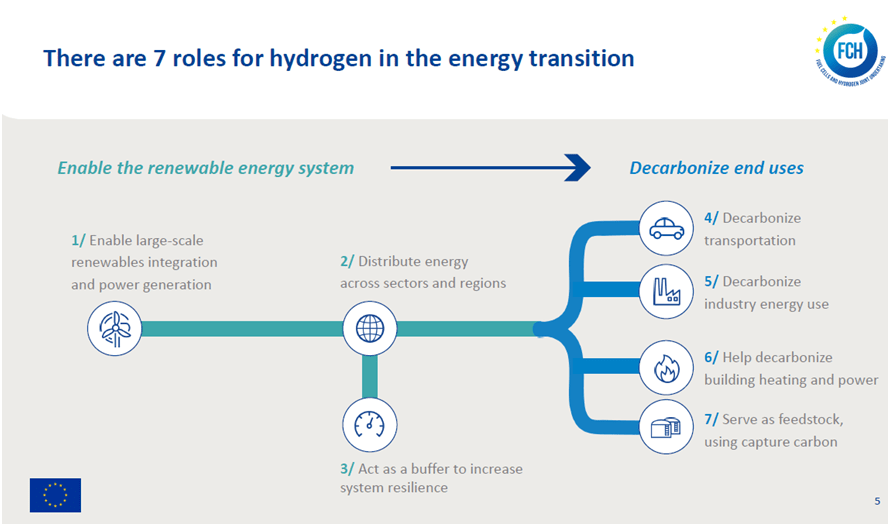
Then, the University of Cantabria made an exhibition of the most relevant European projects on hydrogen technologies that are ongoing, among which stand out HYLANTIC Project and PEMFC-Sudoe Network Project. The project bound4blue, in collaboration with the Government of Cantabria, was also presented.
The meeting continued with the review by Roland Berger team of the different approaches for funding of FCH projects. Several potential funding sources for FCH projects were checked such as R&I funding (Horizon 2020 through the FCH JU), Structural funds (European Regional Development Fund (ERDF) and Cohesion Fund (CF)), Thematic Platforms (CEF), Technical support instruments (ELENA), National/Regional funds and Soft Loans (European Investment Bank (EIB)).
To close the meeting, a discussion on the future needs of the Regions and Cities was established in order to overview the way ahead of the FCH Regions Initiative. Establishing contacts between regions with common interests, organizing meetings and visits to visualize and evaluate success implementation cases, as well as improving the knowledge of technologies by the public administration and general public were the most relevant issues that were put on the table.
Finally, to close the event, the participation of the attendants was appreciated and we were all invited to the last General Assembly of the Initiative that will be held in Brussels on May 18.
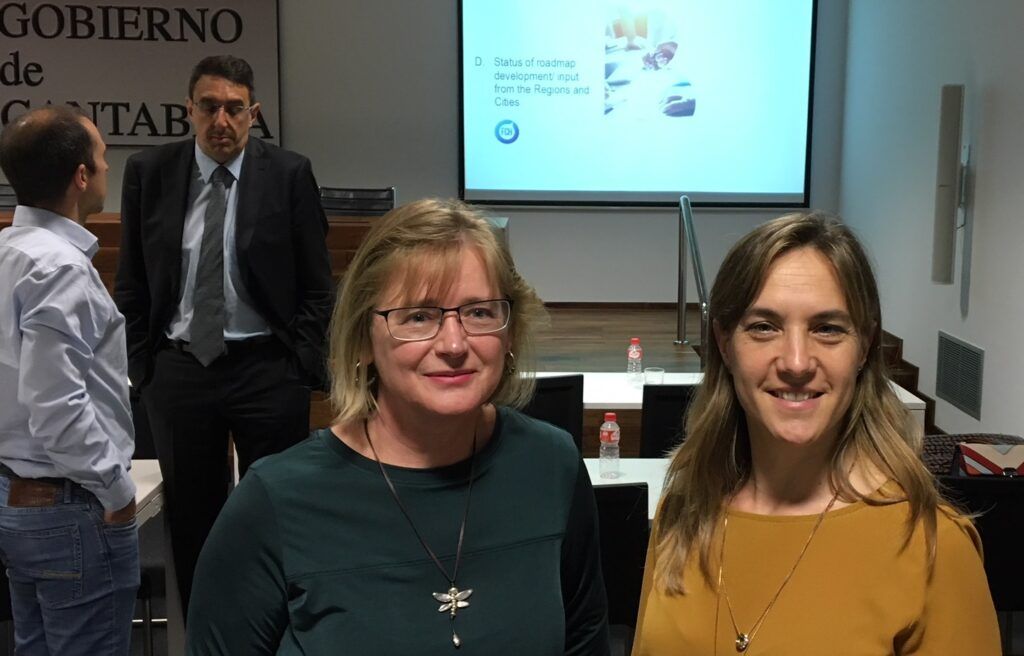 Mª José Ruiz (Director of the Municipal Energy Agency of Valladolid) and Henar Olmedo (Cidaut Project Manager)
Mª José Ruiz (Director of the Municipal Energy Agency of Valladolid) and Henar Olmedo (Cidaut Project Manager)
by cidaut | Mar 15, 2018 | Sin categoría
FCH Regions and cities initiative (http://www.fch.europa.eu/page/about-initiative) has set a series of workshops of the in different cities throughout in February- March 2018. The first one took place the 14th of February in Puertollano (Spain) in the National Centre of Hydrogen facilities. CIDAUT and Valladolid City Council had the opportunity to assist as part of the consortium of the initiative.

The workshop was attended by the mayor of Puertollano, Mayte Fernández, who together with the Minister of Economy of Castilla La Mancha, Patricia Franco, welcomed the opening of the Congress. Both stressed that the workshop was a good opportunity to expose the great potential of hydrogen in terms of energy. Emilio Nieto as Director of the National Centre of Hydrogen made an introduction to give way to the beginning of the workshop.
The workshop also had the presence of Enrique Girón as a representative of the FCHJU who kindly attended to all the doubts of the attendees regarding the initiative, as well as other issues related to projects financing. During the whole workshop the debate was moderated by the Roland Berger consultancy as coordinators of the initiative.
The different speakers were exposing the opportunities of hydrogen as an alternative energy source. Thus, Guillermo Figueruelo of the Hidrogeno Aragón Foundation presented the different projects they are involved such as HyER and BIGH2IT.
Carlos Funez presented the projects on hydrogen generation, hydrogen refuelling stations and the promotion of hydrogen vehicles from the point of view of CNH2 and INDHO. Jose Antonio Gago from ENAGAS presented a flagship proposal on Hydrogen corridors to cover Spain and Portugal, proposal that is supported by numerous entities that gathers a great consortium.

Regarding Valladolid, Henar Olmedo from CIDAUT stated that the City Council of Valladolid is working in a FCH roadmap, and, as signatory of the Covenant of Mayors, it has a Sustainable Energy and Savings Plan (SEAP). Any improvement of energy efficiency goes through the study and use of alternative energy to fossils such as renewable energy and can be hydrogen. The project to be implemented by the city council comes first in the awareness of citizens towards an unknown source of energy and reputed to be dangerous. Within the FCH technologies, the municipality has in mind the use of hydrogen in garbage trucks or buses.

Finally, as the closing of the event, the attendance of all the participants was appreciated and the next workshop was located in April, possibly in Santander.
Page 6 of 8« First«...45678»











